
 |
|||||||
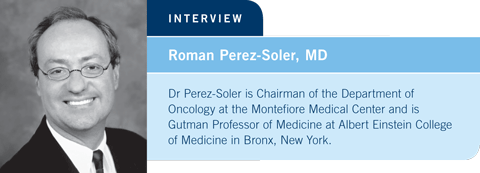
| Tracks 1-19 | ||||||||||||||||||||||||||||||||||||||||
|
Select Excerpts from the Interview
Tracks 21, 28
![]() DR LOVE: What are your thoughts about the selection of a chemotherapy
regimen to be combined with bevacizumab in advanced NSCLC?
DR LOVE: What are your thoughts about the selection of a chemotherapy
regimen to be combined with bevacizumab in advanced NSCLC?
![]() DR PEREZ-SOLER: The AVAiL study results, reported at ASCO 2007, demonstrated
that bevacizumab adds benefit to the cisplatin/gemcitabine chemotherapy
regimen (2.1). Improvements in response rate and progression-free
survival have been observed with the addition of bevacizumab (2.2).
DR PEREZ-SOLER: The AVAiL study results, reported at ASCO 2007, demonstrated
that bevacizumab adds benefit to the cisplatin/gemcitabine chemotherapy
regimen (2.1). Improvements in response rate and progression-free
survival have been observed with the addition of bevacizumab (2.2).
The hazard ratios were good (Manegold 2007) but not as good as what was seen in ECOG-E4599, which evaluated the addition of bevacizumab to carboplatin/paclitaxel (Sandler 2006; [3.2]).
Initially, the premise was that bevacizumab would work independently of the chemotherapy used. I believe we are starting to learn that may not be true. Some chemotherapy regimens are better than others. For example, cisplatin/gemcitabine — which was used in AVAiL — may not be as good of a backbone as carboplatin/paclitaxel.
Some chemotherapeutic agents, particularly taxanes, are toxic to endothelial cells. They destroy blood vessels, which may help an anti-angiogenic agent and might explain why a taxane, at least in lung cancer, may be better. So it seems that a taxane-based regimen is probably a better option.

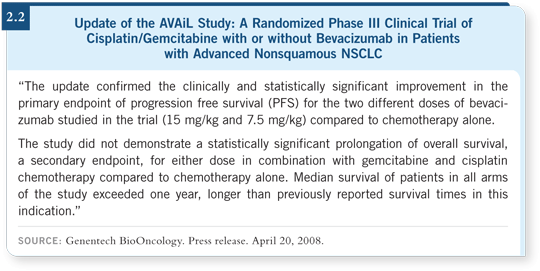
![]() DR LOVE: What are your thoughts on bevacizumab/erlotinib?
DR LOVE: What are your thoughts on bevacizumab/erlotinib?
![]() DR PEREZ-SOLER: The data so far are encouraging. In the initial study by
Roy Herbst with about 30 patients who failed at least one platinum-based
regimen, the overall survival was one year with bevacizumab/erlotinib (Herbst
2005b). In CAN-NCIC-BR21, the overall survival was about eight months
for that group when treated with erlotinib alone (Shepherd 2005).
DR PEREZ-SOLER: The data so far are encouraging. In the initial study by
Roy Herbst with about 30 patients who failed at least one platinum-based
regimen, the overall survival was one year with bevacizumab/erlotinib (Herbst
2005b). In CAN-NCIC-BR21, the overall survival was about eight months
for that group when treated with erlotinib alone (Shepherd 2005).
In the study by Fehrenbacher, bevacizumab added benefit to erlotinib (Herbst 2007; [1.2]). The good news was that this combination of two nonchemotherapeutic agents — bevacizumab and erlotinib — was superior to single-agent chemotherapy (docetaxel or pemetrexed).
Bevacizumab also added benefit to single-agent docetaxel or pemetrexed, so you could also combine pemetrexed or docetaxel with bevacizumab as second-line therapy for a better regimen (Herbst 2007).
However, the key issue is that patients who receive bevacizumab will receive it as front-line therapy. Once their disease has progressed, who will have the guts to keep pushing bevacizumab without data?
The BeTa trial, comparing erlotinib to erlotinib/bevacizumab, is being conducted only with patients who have never received bevacizumab as front-line therapy (2.3). It will probably be positive for the combination, but then the question will be how relevant this study is in practice because none of the patients in the trial received bevacizumab as front-line therapy.
I believe many people will conclude that it doesn’t mean anything. We need to determine whether bevacizumab is a good drug as second-line therapy for patients who have received bevacizumab as front-line therapy.
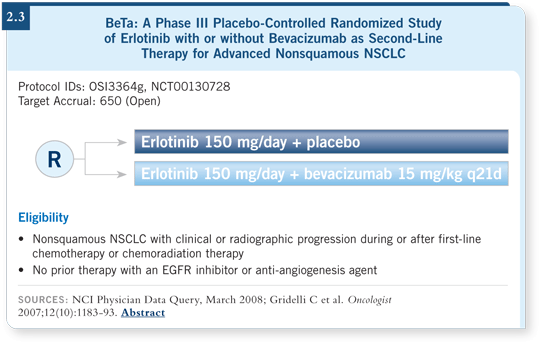
Tracks 12-13
![]() DR LOVE: Can you review the RADIANT study?
DR LOVE: Can you review the RADIANT study?
![]() DR PEREZ-SOLER: RADIANT is evaluating adjuvant chemotherapy followed
by erlotinib administered for two years (2.4). It selects patients with EGFR-positive
disease as determined by IHC or FISH.
DR PEREZ-SOLER: RADIANT is evaluating adjuvant chemotherapy followed
by erlotinib administered for two years (2.4). It selects patients with EGFR-positive
disease as determined by IHC or FISH.
The RADIANT trial is a good study for any patient who clearly has EGFR-positive disease. The issue will be whether a patient can receive erlotinib for two years — if that would be tolerable.
I believe it will be tolerable for most patients. The first two months may be rough, but after two months of erlotinib, the majority will find that the toxicity subsides and the skin rash improves. A minority will need a dose reduction or will not be able to tolerate the drug.
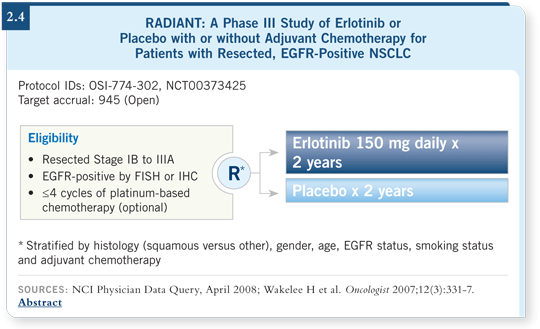
Track 15
![]() DR LOVE: Can you discuss the INTEREST study comparing gefitinib to
docetaxel as second-line therapy?
DR LOVE: Can you discuss the INTEREST study comparing gefitinib to
docetaxel as second-line therapy?
![]() DR PEREZ-SOLER: The trial met the noninferiority criteria (2.5) in that the
curves were the same. The most interesting finding was that all the subsets
that traditionally had been identified as good candidates for an EGFR inhibitor
were also good candidates for docetaxel, as the nonsmokers and those
with FISH-positive disease fared equally well with docetaxel as they had with
gefitinib (Douillard 2007).
DR PEREZ-SOLER: The trial met the noninferiority criteria (2.5) in that the
curves were the same. The most interesting finding was that all the subsets
that traditionally had been identified as good candidates for an EGFR inhibitor
were also good candidates for docetaxel, as the nonsmokers and those
with FISH-positive disease fared equally well with docetaxel as they had with
gefitinib (Douillard 2007).
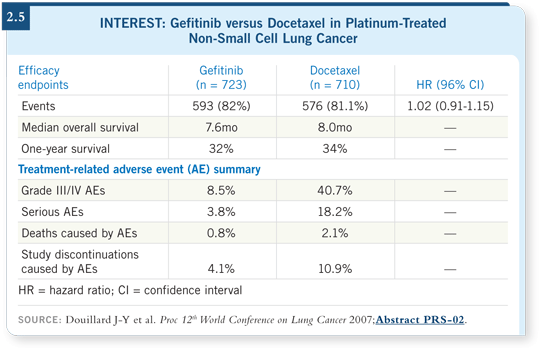
| Table of Contents | Top of Page |
EDITOR
Neil Love, MD
INTERVIEWS
Mark G Kris, MD
- Select publications
Roman Perez-Soler, MD
- Select publications
Julie R Brahmer, MD
- Select publications
Philip Bonomi, MD
- Select publications
Lung Cancer Update:
A CME Audio Series and Activity